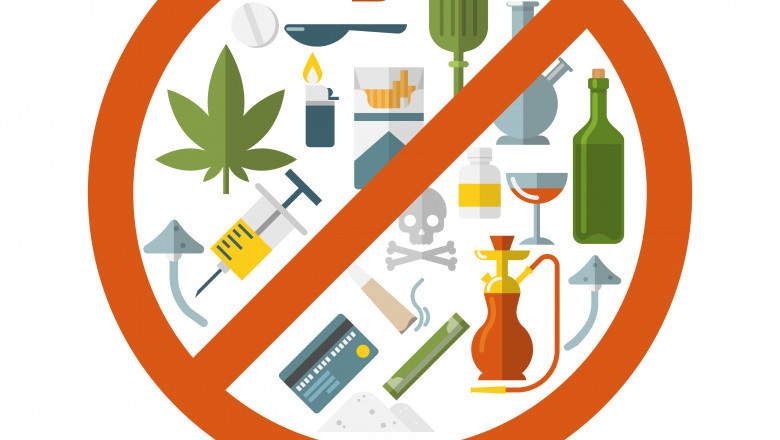views

What is NDPS Act Punishment?
To curtail drugs and psychotropic substances, the government took measures like NDPS Act. Here are the punishments for using and selling such substances.
The Narcotic Drugs and Psychotropic Substances (NDPS) Act, 1985 is the central legislation governing the production, use, and transportation of those hazardous substances as defined under the same. The Act got enacted to turn people away from illegal objects that could interfere with the physical well-being of each individual.
It extends throughout India and in areas outside of India—to all citizens beyond the territorial jurisdiction of the country or people on ships or planes registered in India.
The Act has provided complete definitions of all keywords under the scope of the Act. It emphasized the power of the Central Government over the provisions of the Act and how much power they have to enforce the law. The NDPS act punishments are severe and are regulated to stop the use and production of hazardous substances.
Offenses and penalties under the Act
Chapter IV from Sections 15 - 40 provides various offences and penalties under the Act. It has identified certain acts contrary to the public norms and standards set out in the category of 'offenses'.
These activities are prohibited by law because of the effect they have on an individual's health. These substances have the potential to harm a person's mental faculties too. Even if it relieves a person of any suffering for a while, its effects can be devastating over time.
Poppy straw
Section 15 of the Narcotic Drugs and Psychotropic Substances Act provides for producing, managing, transporting, selling, purchasing, and any other involvement that will lead to a case under the provisions of this Section. Punishments are determined based on the number of poppy straws involved in every transaction.
A small number of poppy straws can lead to one year of rigorous imprisonment or a fine, up to ten thousand rupees, or both. A quantity more than a small amount but less than the market value will call for ten-year imprisonment and a fine of up to one lakh rupees.
In the case of a transaction involving the price of poppy straw, the penalty includes imprisonment for a term not less than ten years and an extension of up to 20 years, and a fine, not less than one lakh rupees but up to two lakhs rupees.
Coca plant and leaves
Section 16 of the Act provides for provisions that are contrary to the rules made under the Act regarding the investment, production, acquisition, acquisition, sale, purchase, transport, and any other activity in respect of a breach of the provisions of this Act.
Penalty under the Section includes a maximum of ten years imprisonment and a fine of up to one lakh rupees.
Prepared opium
Section 17 of the Act provides for provisions relating to activities in contravention of the Act in terms of modified opium. This Section prohibits manufacturing, seizing, selling, purchasing, transporting, or using the prepared opium. It has been identified as a potential source of harm to a person, both physically and mentally. The punishment for carrying out any restricted activity is the same as those for poppy straw, listed under Section 15.
Manufactured drugs and preparations
Section 21 of the Act provides for the manufacture, possession, sale, purchase, transport, or use of any medicine manufactured or modified as an act in contravention of the provisions of the Act. The punishment under this Section is the same as the three-section penal system listed in the other sections of the Act.
Psychotropic substances
Section 22 of the Narcotic Drugs and Psychotropic Substances Act provides for any rule or action relating to the process of manufacture, transport, sale, purchase, handling, or use of psychotropic drugs that may result in a criminal offence under this Section. The punishment under this Section is also the same as the three punishments followed in other cases under the Act.
Transmission of narcotic drugs and psychotropic substances
Section 23 of the Act provides for the export or export of any illegal drug prescribed under the Act from India. The distribution of alcohol and psychotropic drugs is limited under the official language under the scope of this Act. Criminal penalties include the same three-phase penal system followed everywhere under the Act.
External dealings
Section 24 of the Act provides for foreign drug dealing with psychotropic drugs outside India to other persons living in the area beyond the borders of India. It is an offence under this Section. The imprisonment for this offence is rigorous imprisonment for a term not less than ten years, up to 20 years, and a fine, not less than one lakh rupees, and can get advanced to two lakh rupees.
Allowing premises for crime
Section 25 of the Act provides a situation where a person allows their property to commit any offence mentioned under the Act. One must know and support the perpetrator to operate this Section.
Conclusion
The NDPS Act, 1985 was established to regulate and control these illegal substances' transportation, use, and or consumption. The purpose for which the Act came into enactment has been achieved in its implementation plan. The central government and state governments have successfully introduced legislation relating to the Act to maximise its public impact.
Cases identified under the Act have also had an opportunity for a fair trial while adhering to the principles of natural justice. The right to appeal is also provided against a decision of the Tribunals. The NDPS act punishment is different for different crimes. No one could get spared for using or selling such drugs specified above and many more.












